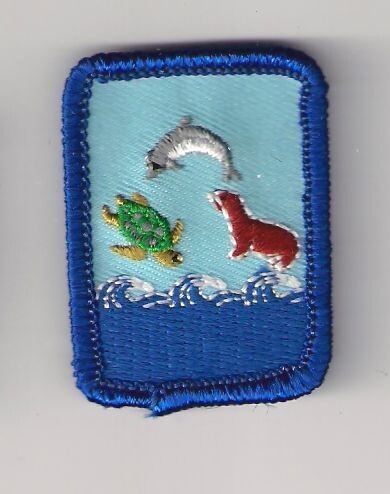Ocean Discovery GSCSNJ Council own IP (Original)
REQUIREMENTS:
Ocean Discovery The Ocean Discovery IP is an interest project from the Girl Scouts of Central and Southern New Jersey Council.
Skill Builders
1. Learn about NOAA (National Oceanic & Atmospheric Administration), and explore its National Marine Fisheries Service. What does NOAA do?
2. Make a list of the marine animals that have been classified as endangered species in your state or a neighboring state. Make a drawing of each animal or include a picture of each. What are some reasons animals become endangered? What laws protect endangered marine animals? In what ways can you help endangered species?
3. Choose at least two marine animals (i.e. penguins, sharks, whales, etc.). Find out a few fun facts about each. For example, find out what they eat, how much they eat in a day, their scientific names, where you can find them, or what a group of the animal is called (Ex. A group of birds is called a flock.).
4. Learn about the hidden treasures of the ocean. Discover how shells, beach glass, coral, and sand are made.
5. Many marine mammals, such as whales, sea lions, and dolphins, perform in shows at aquariums and theme parks all over the world. Find out how captive animals are trained. What kinds of tools and techniques are used to teach behaviors to animals?
6. Take a trip to your local library and read an informational book about any marine animal that interests you. Share what you learned with another troop of any age or someone who shares your interest on marine animals.
7. Visit a US Aquarium, International Publics Aquarium, Marine Park, Marine Museum, or a Maritime Museum to enhance your knowledge of marine animals. If you do not have a local aquarium near you, take a virtual tour of one on-line.
Technology
1. What pollutants are present in today's oceans or on today's beaches? Research how those pollutants harm the wildlife? What is being done to correct the problem?
2. What technologies exist today to explore our oceans? Learn about some of the advances that have been made over the past 50 years?
3. What role do satellites play in mapping our oceans? Find out what a Geostationary Satellite does.
4. What does the Center for Operational Oceanographic Products and Services, (CO-OPS), manage and why is it so important? Hint: Tides & Currents
5. The Office of Protected Resources has joint responsibility with the U.S. Fish & Wildlife Service for implementing the Endangered Species Act (ESA) and Marine Mammal Protection Act (MMPA). All marine mammals are protected under the Marine Mammal Protection Act (MMPA). What are these Acts and does this technology shape the future of our oceans and marine animals.
Career Exploration
1. What careers involve working with sea life? Use books, magazines, or the Internet to research marine science careers. You can also check to see if your local library has a copy of the Occupational Outlook Handbook, which gives detailed job descriptions, including the nature of the work, working conditions, training, other qualifications, and advancement, employment, job outlook, earnings, and related careers.
2. Attend a Girl Scout Destination to learn about marine animals, (example: SeaWorld Adventure Camp), or enroll in a class offered by a local aquarium.
3. Learn about the remarkable women who explore the oceans, (oceanography), and how they contribute to our understanding and appreciation of the ocean and how they go about their daily work.
4. Learn about "OceanAGE Careers." Ocean Another Generation of Explorers is a website that has interactive online ocean careers that inspire students to learn more about oceanography.
5. Can you turn your love for animals into a career? Explore the local library or search the World Wide Web to find out what training and education you would need to establish a career in a Zoological Park.
Service Projects
1. Participate in a project that will benefit marine or coastal environments (i.e. Make a flyer or pamphlet based on what you have learned about pollutants, and indicate the ways in which others can help and protect wildlife and their habitats; Take part in a dune grass planting)
2. Participate in a project to cleanup our waters and streams. Plan a trip with your troop or a group of friends to a nearby beach or lake and take a walk by the shoreline, picking up and properly disposing of the debris you find.
3. Learn about Marine Animal Rescue Programs. Educate your peers or a younger group of children about the many men and women who volunteer their time to help save stranded marine animals. Find out what to do if you see an injured, stranded, or distressed marine animal.
4. Help keep our oceans and marine animals safe. Brainstorm on ways that you can help and share your knowledge with others. Knowledge is "power" and so are pictures. Design a poster or write to your local paper and get the word out on how they can help protect our waters and their inhabitants, (be responsible when viewing wildlife, report a beached marine mammal, report wildlife harassment.)
5. Create a game to teach others about what you've learned (board game, card game, etc.). It can cover anything: marine animals, marine careers, endangered species, or pollution. After creating the game, teach it to your peers or a younger group of children.
